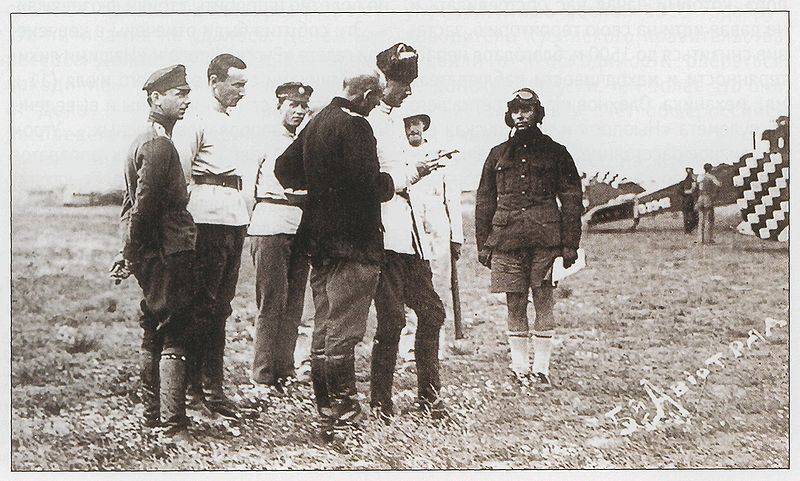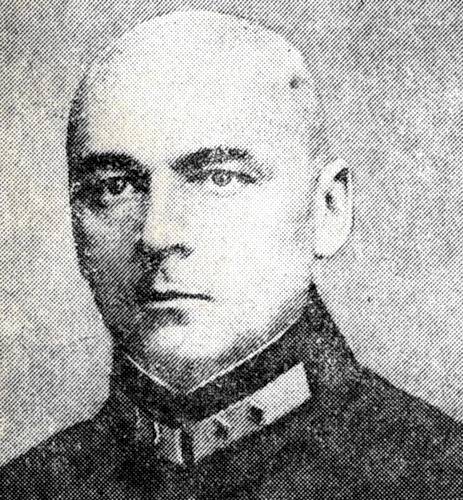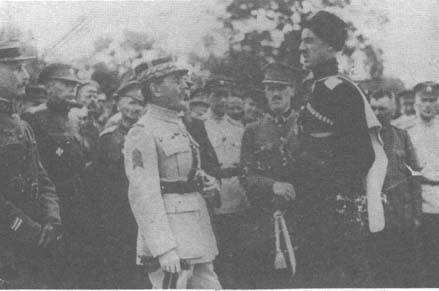The first victories of the Wrangel army

General P.N. Wrangel accepts the report of the pilot of the 5th squadron
Smoot. 1920 year. The threat of hunger pushed the Wrangelians to Northern Tavria, where it was possible to capture the grain harvest. Crimea as the base of the White movement had no future. It was necessary to capture new areas in order to continue the struggle.
April battle
April 4, 1920 Wrangel took command. A few days later, intelligence reported that the Red Army was preparing a new assault on the Crimea. Artillery pulled together and aviation. The 13th Soviet army under the command of I. Spiders was strengthened, its shock group consisted of 12 thousand soldiers and 150 guns. It included a select Latvian division and a 3rd rifle division, which included many internationalists.
The Wrangel army at that time numbered 35 thousand people. But only 5 were combat-ready. Slashchev Corps and Volunteer Corps. The remaining troops after the defeat in the Kuban and the North Caucasus were demoralized, deprived of material parts. They needed to be put in order, replenished and armed. Volunteers were urgently sent to strengthen Slashchev.
On April 13, 1920, the Latvian arrows overturned the advanced units of Slashchev, occupied the Turkish Wall and began to develop the offensive. The 8th cavalry division of the Reds crossed the Chongar direction. The Sushchites counterattacked, stopped and pressed the enemy. However, the Reds clung to the Turkish Wall and stood firmly, constantly receiving reinforcements. Both sides fought bravely and suffered serious losses. They managed to turn the tide only with the help of volunteers. Parts of the Volunteer Corps, one after another, were drawn to the scene of the battle and went on the attack. By evening, the Reds were knocked out from Perekop. At the Chongar crossing, the Reds met the cavalry of General Morozov. After a hard collision with Dzhankoy, White threw the enemy away.
Wrangel decided to develop the first success. Gathering an attack group of sweethearts, Kornilovites, Markovites, reinforced by cavalry, several armored cars, on April 14, the White went on a counterattack. They broke through the position of the Reds, seized the exit from Perekop. However, the Soviet command launched a counterattack with the help of cavalry and restored the situation. Then the Red Infantry attacked again, but without success.
A large role in the retention of the Red Army on the Crimean isthmuses is the White Black Sea Fleet. The 1st Black Sea Detachment supported the defense of Perekop. The Azov detachment supported the defense of the Arabat arrow. In mid-May, the white fleet raided Mariupol. White fired on the city, captured and stole several ships that the Reds prepared for military operations. With complete superiority at sea, Wrangel decided to strike on the flanks with the help of landings. On April 15, 1920, the Drozdov brigade (2 regiments with 4 guns) was landed in Khorlakh, 40 km west of Perekop. On the same day, the Wrangel troops landed at Kirillovka - 60 km east of Chongar (a detachment of captain Mashukov was 800 soldiers with one gun).
The White Guards could not achieve serious success with the help of the landing operation. The forces were not enough. Before landing, enemy landing forces discovered red aircraft. The Soviet command took countermeasures in time. Several aircraft raided Kirillovka, attacked the landing, drowned a barge with ammunition and drove off the ships that supported the White Guards with fire. Then volunteers attacked parts of the 46th Infantry Division. The Wrangelites were able to destroy the railway, and then with great difficulty and loss broke through to Genichesk, where the ships evacuated them. Drozdovites near Khorly caused a commotion in the rear of the enemy and after two days of heavy fighting broke through to Perekop. During the landing, the White Guards lost about 600 people killed and wounded.
Thus, the white landing did not cause the collapse of the defense of the 13th Soviet Army. However, another storm of the Crimea was disrupted. The Soviet command realized that it underestimated the enemy and the degree of decomposition of the White Army. A new attack was postponed to May in order to tighten additional forces. The Red Army temporarily switched to defense, new firing positions, fortifications and barriers were built to lock the enemy on the peninsula.
The April battle was important for the White Army. Despite the losses, the Wrangelites believed in themselves, the authority of the new commander in chief strengthened. The army quickly restored order and discipline. They acted according to the law of wartime - up to the military field courts and executions for robberies and violence. Offending officers were demoted down to rank and file. The troops began to come to life, again believed in themselves. Behind the rear they saw that the army, at least, could hold the defenses. The White Command abandoned plans for immediate evacuation and at the end of April approved a plan for a general offensive from Crimea. In addition, the situation on the Western Front inspired hope, where the Polish army launched its offensive. The Soviet high command began to transfer forces and reserves from all directions to the west. The only cavalry division was removed from the Crimean direction and sent to war with the Poles.

Commander of the 13th Army of the Red Army I. Kh. Spider
The need for a breakthrough from Crimea
At the end of April 1920, Wrangel approved an offensive plan from the Crimea. The idea of the offensive was associated with two main reasons. Firstly, the moment seemed favorable. The Red Army solved more serious tasks on the Western Front, fought with Poland. Secondly, Crimea, cut off from the mainland, deprived of Western help, clogged with refugees, was on the verge of hunger and a fuel crisis. Hundreds of thousands of refugees and tens of thousands of military retreating to the Crimea destroyed all food supplies of the peninsula. The threat of hunger pushed whites to northern Tavria, where it was possible to capture the grain harvest. Crimea as the base of the White movement had no future. It was necessary to capture new areas in order to continue the struggle.
The plan involved a quick capture of the Dnieper - Aleksandrovsk - Berdyansk region. With the success of the first stage of the offensive, the second stage began: movement on the Dnieper-Sinelnikovo-Grishino-Taganrog line. Further, it was supposed to return to the Kuban and Don, where they were going to restore the main base of the White Army. The Black Baron did not want to launch a decisive offensive in Ukraine. First, the local peasantry for the most part did not support the White Guards, preferring the Reds, Anarchists, Greens and Petliurists. Secondly, the Wrangelites did not want a clash with Petliura and the Poles. Thirdly, Wrangel believed that the main human resource of the White Army is located on the Don and Kuban. Cossacks could give the White Movement 50-70 thousand fighters, and with such force could repeat the attack on Moscow.
With the failure of the offensive, White planned to seize the food resources of Northern Tavria and gain a foothold in Crimea again. Wrangel hoped for a successful offensive in connection with a new deterioration in the situation of Soviet Russia. Poland, Petliurists, various Ukrainian chieftains opposed the Bolsheviks, in Belarus in alliance with the Poles of a part of Bulak-Balakhovich (he had previously fought as part of the Yudenich army). There were also hopes for large-scale uprisings of the Cossacks in the Don and Kuban. The Soviet command eased pressure on the Crimea in connection with defeats from the Poles. The White Guards were in a hurry to take advantage of this.
The Russian Army
In late April - early May 1920, the White Command, preparing for the offensive, reorganized the army. In early May, Wrangel celebrated the successful evacuation of parts of the Kuban and Don army, which retreated to the Sochi region. The white army in the Crimea was replenished. The total number of Wrangel’s army grew to 40 thousand people, but on the front line was 24 thousand people. There were very few cavalry - only 2 thousand sabers.
On May 11, 1920, the Armed Forces of the South of Russia were transformed into the Russian Army. The name “Volunteer Army” was abolished as carrying an element of spontaneity and partisanism. The 1st Army Corps (formerly Volunteer) was headed by General Kutepov, it included the Kornilov, Markov and Drozdov divisions. The 2nd Army Corps was led by General Slashchev, it included the 13th and 34th Infantry Divisions, a separate cavalry brigade. The 1st and 3rd Kuban cavalry divisions, the Chechen brigade entered the Consolidated Corps of General Pisarev (in July the Consolidated Corps was reorganized into the Horse Corps). Abramov’s Don Corps included the 1st and 2nd Don Cavalry and 3rd Don Infantry Divisions. The name "cavalry divisions" was originally conditional, since there were no horsemen. The army also included artillery (two brigades), aviation, tank parts and armored trains.
The baron was able to suppress intrigues in the army and on the peninsula for some time. In the Don Corps, General Sidorin and Kelchevsky (the former commander of the Don Army and its chief of staff) were turbid. Rumors were spread that “the Cossacks had been betrayed”, that the command preferred volunteers, and the donors were kept in a black body. It was proposed to break the alliance with the volunteers and go to the Don. There to raise a new uprising and restore the Don Republic. Despite the threat of conflict with the Cossacks, Wrangel removed the generals from their posts and put them on trial for “separatism”. They were sentenced to 4 years of hard labor, deprived of all ranks and awards. Then the sentence was softened, and Sidorin and Kelchevsky were sent abroad. General Abramov was appointed commander of the Don Corps.
The Duke of Leuchtenberg and his accomplices, who intrigued in favor of Grand Duke Nikolai Nikolaevich, were also exiled abroad. He tried to organize a performance naval officers. Wrangel did not go to rapprochement with the Crimean right, with their leader Bishop Benjamin. The right-wing circles, which had hoped that the new commander-in-chief would make a radical turn in politics, were wrong. Wrangel's government as a whole repeated Denikin's policy, with minor differences in details. Wrangel said in a conversation with reporters:
Relations with the West have somewhat revived. Britain was still trying to negotiate with Moscow, but since the Soviet government was slow to retaliate, the British decided to help Wrangel. In particular, before the start of the April battle, the British sent coal for the fleet, which greatly helped the whites in the operation. But in May, the British officially dropped their support for the White movement. Things were better with France. In winter, Paris supported the idea of London to lift the economic blockade from Soviet Russia, and then tried to coordinate its actions with the British. However, now the position of the French has changed. The French government actively supported Poland as the main enemy of Germany and Russia in Eastern Europe. The White Army was Poland's natural ally in the fight against the Bolsheviks. Also, the French were quite rightly afraid that the Bolsheviks would not repay the debts of old Russia.
Therefore, the French authorities de facto recognized the Wrangel government. The Russian army was promised material assistance and provisions, support for the French fleet in the defense of the peninsula, and assistance in evacuation if the White Army were defeated. The head of the French mission, General Mangen, tried to coordinate the actions of the Wrangelians and Poles (without success). Under Wrangel, American aid began to arrive in Crimea: machine guns, medicines, and provisions (the United States was against an agreement with the Communists).

The meeting of P. N. Wrangel and the head of the French military mission S. Manzhen
To be continued ...
- Alexander Samsonov
- https://ru.wikipedia.org/
- Smoot. 1920 year
Battle of Rostov
The disaster of white Odessa
How Slashchev Crimea defended
Dono-Manych battle
The death of the Northern Army Miller
Why Western agent Kolchak is turned into a hero and martyr of Russia
The defeat of the army of Denikin in the battle of Tikhorets
How did the Ice Siberian campaign end
The fall of the White Kuban
Agony of White Novorossiysk
The death of the Kuban army
Denikin's resignation
Far Eastern Republic and the Japanese threat
Polish "liberation" campaign in Kiev
Baku “Blitzkrieg” of the Red Army
The battle for Belarus. May operation of the Red Army
War of the Russian Army Wrangel
Information